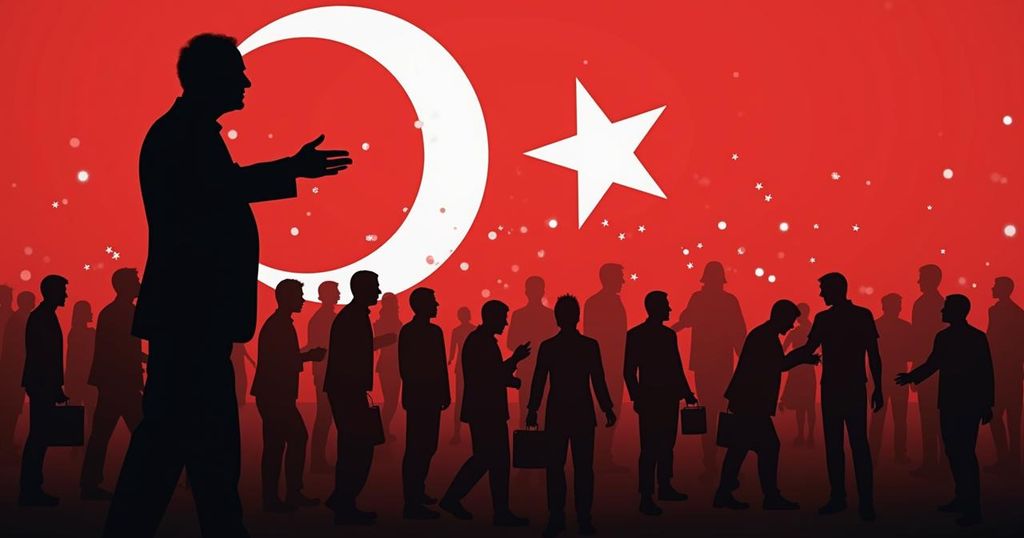Tunisian Presidential Election: Anticipated Landslide Victory for Kais Saied Amid Voter Apathy

Tunisian President Kais Saied is likely to win the presidential election with a projected 89.2 percent of the vote, amid an alarming voter turnout of less than 30 percent. Saied’s rule, marked by an extension of his powers since 2021 and economic difficulties, faces boycott calls from the opposition who label the election as a sham.
Tunisian President Kais Saied is poised for a significant victory in the presidential election, anticipated to garner approximately 89.2 percent of the votes, as suggested by exit polls disclosed via state television on Sunday. This projected outcome stands to solidify Saied’s authority, which he markedly augmented after centralizing power in 2021. Although the official vote count will be made public on Monday evening, the election was characterized by notably low voter engagement, with a participation rate of under 30 percent, marking a stark contrast to the 49 percent turnout witnessed in the first round of the 2019 elections. In this electoral round, President Saied faced two challengers: imprisoned businessman Ayachi Zammel and former supporter turned leftist candidate Zouhair Maghzaoui. Saied, noted for his legal academic background and ascendancy to power fueled by public discontent with post-revolution governance, is expected to prevail predominantly due to his opponents’ insignificance within the electoral landscape and their physical incapacity to contest fully. His inaugural term has been overshadowed by economic hardships and an augmentation of his political dominion, particularly after he suspended parliamentary activity and amended the constitution in 2021. The opposition, facing considerable suppression, has urged a boycott, deeming the election process a mere facade. As the polling concluded, approximately 2.7 million voters—equating to 27.7 percent of the voting populace—partook in the election, a significant decrease relative to previous turnout metrics. Various potential candidates expressed interest in confronting Saied; however, only three received approval from the presidentially appointed electoral commission. Following his election in 2019, Saied, now aged 66, has asserted a position against relinquishing power to what he characterizes as “non-patriots.” In his candidacy announcement earlier this year, he proclaimed, “Whoever talks about restrictions is delusional,” denying allegations of imposed limits on competitors and emphasizing a non-acceptance of foreign interference in Tunisia’s electoral decisions. Economically, Tunisia confronts ongoing grave challenges, including a public debt exceeding 80 percent of the country’s GDP and a current account deficit of 15 percent, exacerbated by surging prices of essential imports amidst global inflationary pressures and ramifications from the Russia-Ukraine conflict.
The backdrop to this election involves Tunisia’s socio-political landscape in the aftermath of the 2011 Arab Spring, a defining period that led to significant governmental changes. The transition to democracy has been fraught with economic turbulence and a fractious political arena, culminating in Kais Saied’s election in 2019 amid widespread dissatisfaction with the existing political class. Following his expansion of powers in 2021, Saied has faced scrutiny and opposition, particularly given the subsequent suspension of parliamentary functions and alterations to the constitutional framework. The electoral environment in Tunisia is now defined by diminished public confidence in democratic processes and a rising tide of autocratic governance.
In summary, the forthcoming reelection of President Kais Saied appears imminent as he is anticipated to achieve a wide margin of victory amidst considerable voter disengagement. His consolidation of power since 2021 has attracted extensive critique, particularly from opposition forces who view the elections as a manipulated exercise. With Tunisia’s economy in a precarious state, the implications of Saied’s continued presidency on both domestic policies and international relations remain to be seen, particularly in light of the significant challenges the nation currently faces.
Original Source: www.middleeasteye.net







